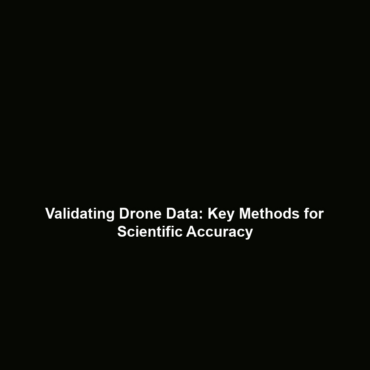Methods to Ensure the Validity of Drone Data in Scientific Studies
Introduction
The use of drones in scientific research has revolutionized data collection, permitting detailed analysis of environments and phenomena from unique aerial perspectives. However, ensuring the validity of drone data is critical to avoid misleading conclusions in scientific studies. This article explores various methods to ensure data integrity and accuracy, shedding light on their significance in the domain of Drones in Science. With the growing reliance on drone technology, understanding these methods is essential for advancing scientific endeavors.
Key Concepts
Validating drone data encompasses several key concepts that enhance both the reliability and integrity of the information collected. Some major principles include:
- Data Calibration: Regular calibration of drone sensors ensures that readings are accurate and reliable, critical for producing valid scientific results.
- Redundancy Checks: Using multiple sensors or data collection methods can help cross-verify data and detect potential discrepancies.
- Geospatial Accuracy: Ensuring proper georeferencing and spatial alignment of data collected is vital for meaningful analysis.
- Data Processing Techniques: Employing sophisticated algorithms and software can help filter out noise and produce clearer data sets.
Applications and Real-World Uses
Methods to ensure the validity of drone data are applied in various scientific domains:
- Environmental Monitoring: Drones collect data on air and water quality; validated data helps track pollution and ecosystem health.
- Agricultural Analysis: Farmers use drones to monitor crop health, relying on accurate data for decision-making about irrigation and fertilization.
- Wildlife Conservation: Drones aid in tracking animal populations and behaviors, contributing to the development of effective conservation strategies.
Current Challenges
Despite advancements, several challenges persist in ensuring the validity of drone data:
- Technical Limitations: Some drones are hindered by battery life and payload capacity, affecting data collection quality.
- Data Management: Handling large volumes of data from multiple sensors poses significant data processing challenges.
- Regulatory Issues: Navigating legal frameworks governing drone usage can complicate data collection for researchers.
- Environmental Factors: Weather conditions may impact the operational efficiency and data accuracy of drones.
Future Research and Innovations
The future of ensuring the validity of drone data is bright, with several promising innovations on the horizon:
- AI and Machine Learning: Integrating AI can streamline data processing and enhance the accuracy of data interpretation.
- Advanced Sensor Technologies: Future drones may be equipped with cutting-edge sensors for improved data collection across various environments.
- Collaborative Platforms: Developing shared platforms for researchers can foster transparency and improve data validity through collective verification.
Conclusion
In summary, ensuring the validity of drone data in scientific studies is paramount for producing reliable and actionable insights. As the realm of Drones in Science continues to evolve, ongoing research and innovation will play a vital role in overcoming current challenges and unlocking new applications. Researchers and practitioners in the field are encouraged to embrace these methods to enhance the integrity of their findings. For more information on the applications of drone technology in various scientific domains, explore our other articles on related topics.
